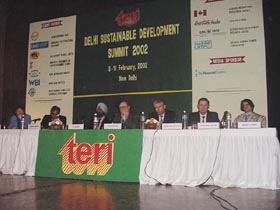10 February 2002: Plenary session 6 Creating business models for the poor:
expanding sustainable development
|
|
| Chairperson |
|
Mr Clive Butler
Corporate Development Director,
Unilever, UK
|
|
| |
| Speaker |
|
Dr T P Singh
Director, TERI School of Advanced Studies
"Companies are recognizing the need to
align their business interests with current developmental thinking."
|
|
| |
| Speaker |
|
Mr Hanns Michael Hoelz
Global Head Sustainable Development, Deutsche Bank,
Germany
"The world
is waiting for action and not mere communication tools."
|
|
|
|
| Speaker |
|
Mr Prasad R Menon
Managing Director, Tata Chemicals Limited,
India
|
|
| |
| Speaker |
|
Mr Emmanuel Haton
Senior Advisor on Lower Carbon Growth, BP, UK
"We need to
get away from the vicious circle; the situation of those in it is going to get
worse."
|
|
|
|
| Speaker |
|
Ms Judith Samuelson
Executive Director, Aspen ISIB, USA
"We need to
balance the complex relationship between business success and social, and environmental
progress."
|
|
| |
| Speaker |
|
Ms Meera Shenoy
Advisor, Society for Elimination of Rural Poverty,
Hyderabad, India
"Small
efforts should be made to make meaningful differences."
|
|
|
|
| Session summary |

There is a need to reorient business mindsets
away from serving affluent clientele towards the less privileged; indeed, we must create
business models that increase the purchasing power of the poor. Though corporates cannot
replace governments, they must consider the interests of customers, employees, and society
beyond their shareholders. Innovative ideas, social networking, and a state-facilitated
conducive environment would catalyse this.
Designs of pro-poor business models should derive from experiences, ambitions, and
ingenuity of the poor as well as mainstream business skills. By creating markets for rural
produce, corporates can strengthen rural economies and also access untapped talent.
Isolationism will not work; businesses must collaborate with NGOs and governments to
empower the poor. Micro-credit is an important learning tool in this context. Another
innovative form of investment is the ‘financial convergence product’, a
combination of working capital, fixed costs, and risk mitigation for sustainable rural
development.
Synchronizing the triple bottom line for sustainable development through addition of
economic value, harmonization of environmental factors, and building social capital in the
community is beneficial.
It is critical to sensitize the managers and leaders of tomorrow about sustainable
development principles. Although the current focus is on maximizing shareholder value,
core teaching in business schools must integrate social responsibility and management for
sustainability. For long-term change, this must also blend into corporate recruitment
policies.
|
|
|